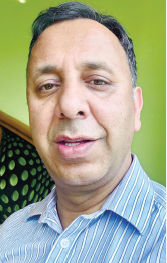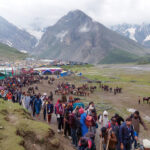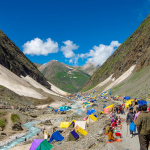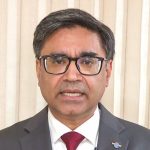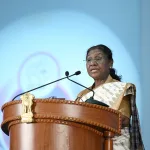In an exclusive interview with Younus Rashid, correspondent, Rising Kashmir, Dr.ShowkatHussain Shah, consultant interventional cardiologist at GMC Anantnag, discusses the growing concern of heart attacks affecting younger adults in their 30s and 40s. He highlights key risk factors, the importance of early detection, and how the newly established Cath Lab at GMC Anantnag is transforming cardiac care in South Kashmir. Dr. Shah also shares valuable insights on lifestyle changes and the future of heart health in the region. EXCERPTS
Can you briefly tell us about your journey as a cardiologist and your association with GMC Anantnag?
My journey as a cardiologist has never been limited to procedures or prescriptions—it has been a purposeful return home. After advanced training in interventional cardiology, I returned to Kashmir determined to address gaps in emergency cardiac care.
GMC Anantnag provided the opportunity. With strong government support and visionary leadership, we established South Kashmir’s first Cath Lab—a major milestone not just for this region, but among newly established medical colleges across India.
This achievement is deeply rooted in the foresight of Principal Prof. Dr.RukhsanaNajeeb, an intensivist and critical care expert. She laid the foundation by setting up a ventilator-supported Surgical ICU, allocating space for the Cath Lab, managing staffing, and resolving power backup challenges. Her involvement went beyond administration—on day one, she inserted the IV line for our first patient and continues to support the program hands-on.
The vision has been brought to life by our interventional cardiology team, led by Dr. Syed Maqbool, whose leadership and composure under pressure have been crucial. What once seemed a dream is now a daily reality—saving lives in South Kashmir.
What are the most common heart-related problems you see in patients from South Kashmir?
We are witnessing a sharp rise in premature coronary artery disease. Heart attacks are increasingly affecting individuals in their 30s and 40s. Key risk factors include uncontrolled hypertension, diabetes, smoking, stress, sedentary lifestyles, and poor dietary habits.
Even more concerning is the delay in seeking care. Many patients underestimate or misinterpret symptoms and, until recently, had to travel long distances for treatment—losing valuable time. The Cath Lab at GMC Anantnag is helping bridge that critical gap.
Do you think people here are aware enough about heart health and early symptoms?
Awareness is growing but much remains to be done. People often ignore early signs like chest discomfort, breathlessness, or fatigue, attributing them to stress or minor ailments.
As both a physician and writer, I believe medical knowledge should not remain confined to textbooks. It must reach families, workers, and youth in relatable terms. Through storytelling, community sessions, and articles, I aim to communicate heart health in a language that resonates—because awareness is the first step in prevention.
How important is the new Cath Lab for South Kashmir?
It is a game-changer. For the first time, people in South Kashmir have local access to advanced cardiac interventions, particularly angioplasty during acute heart attacks—where every minute matters. Before this, patients had to travel to tertiary centers hours away in emergencies.
This facility is more than infrastructure—it’s a statement of healthcare equity and a testament to the government’s vision to bring specialized care to underserved regions and strengthen grassroots public health systems.
How many procedures have you handled since the Cath Lab became operational?
In just over two months, we have successfully performed over 800 cardiac procedures, including primary angioplasties, complex stenting, IVUS-guided interventions, and device-based therapies such as pacemaker implantations.
Each procedure represents a life saved closer to home, a family spared distress, and trust rebuilt in public healthcare.
What treatments are now possible at GMC Anantnag thanks to the Cath Lab?
We routinely perform primary PCI for acute heart attacks, elective angiographies, complex stenting, peripheral interventions, IVUS-guided therapies, and pacemaker implantations. Thanks to the Ayushman Bharat scheme, these life-saving procedures are entirely free for eligible patients—unimaginable for many just a year ago. A farmer or daily wage worker can now access world-class cardiac care without financial burden.
This transformation is due to the clinical leadership of Dr. Syed Maqbool, whose expertise ensures high success rates and makes him a vital pillar of our program.
Besides the Cath Lab, what else is needed to improve cardiac care at GMC Anantnag?
We are progressing steadily, but next steps are vital. We need a fully equipped Coronary Care Unit (CCU), Electrophysiology services for arrhythmias, advanced imaging like Cardiac MRI and Optical Coherence Tomography (OCT), upgraded emergency transport, and ongoing training for staff.
Increasing trained manpower to ensure 24/7 availability is essential. With support from the Medical College Principal and administration, these developments are underway.
Sustained government support prioritizing peripheral healthcare has made this progress possible and will continue to do so.
What lifestyle changes do you recommend to prevent heart disease?
The heart responds more to lifestyle than luck. My simple but powerful advice: engage in moderate daily exercise (e.g., 30-minute walks); avoid excess salt, sugar, and trans fats; quit smoking; ensure good sleep and manage stress through mindfulness or prayer; and get regular check-ups, especially after age 30 or with family history.
Finally, what message you have for youth and the public about heart health?
To the youth: you’re not too young to care for your heart. Habits you form now will echo in your future. Know your numbers. Take responsibility for your health before illness forces you to.
To the wider community: don’t wait for emergencies to raise awareness. Prevention is better than cure—and it is possible, affordable, and within reach.
With infrastructure in place, skilled talent, and strong institutional support, we have a unique opportunity to make heart health a public habit in South Kashmir.


